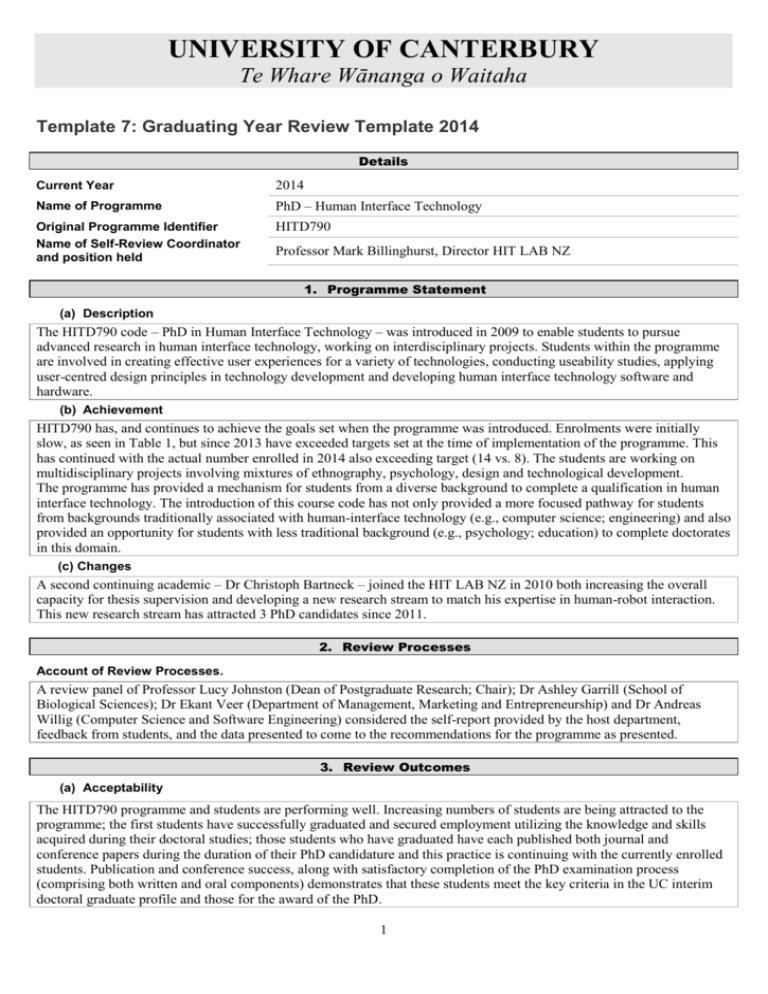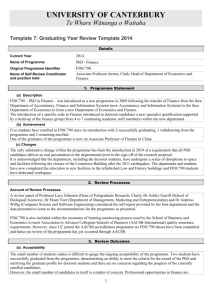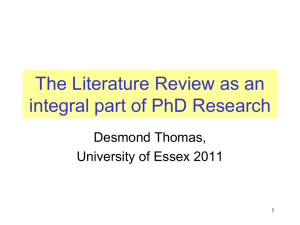PhD - Human Interface Technology
advertisement

UNIVERSITY OF CANTERBURY Te Whare Wānanga o Waitaha Template 7: Graduating Year Review Template 2014 Details Current Year 2014 Name of Programme PhD – Human Interface Technology Original Programme Identifier Name of Self-Review Coordinator and position held HITD790 Professor Mark Billinghurst, Director HIT LAB NZ 1. Programme Statement (a) Description The HITD790 code – PhD in Human Interface Technology – was introduced in 2009 to enable students to pursue advanced research in human interface technology, working on interdisciplinary projects. Students within the programme are involved in creating effective user experiences for a variety of technologies, conducting useability studies, applying user-centred design principles in technology development and developing human interface technology software and hardware. (b) Achievement HITD790 has, and continues to achieve the goals set when the programme was introduced. Enrolments were initially slow, as seen in Table 1, but since 2013 have exceeded targets set at the time of implementation of the programme. This has continued with the actual number enrolled in 2014 also exceeding target (14 vs. 8). The students are working on multidisciplinary projects involving mixtures of ethnography, psychology, design and technological development. The programme has provided a mechanism for students from a diverse background to complete a qualification in human interface technology. The introduction of this course code has not only provided a more focused pathway for students from backgrounds traditionally associated with human-interface technology (e.g., computer science; engineering) and also provided an opportunity for students with less traditional background (e.g., psychology; education) to complete doctorates in this domain. (c) Changes A second continuing academic – Dr Christoph Bartneck – joined the HIT LAB NZ in 2010 both increasing the overall capacity for thesis supervision and developing a new research stream to match his expertise in human-robot interaction. This new research stream has attracted 3 PhD candidates since 2011. 2. Review Processes E Account of Review Processes. A review panel of Professor Lucy Johnston (Dean of Postgraduate Research; Chair); Dr Ashley Garrill (School of Biological Sciences); Dr Ekant Veer (Department of Management, Marketing and Entrepreneurship) and Dr Andreas Willig (Computer Science and Software Engineering) considered the self-report provided by the host department, feedback from students, and the data presented to come to the recommendations for the programme as presented. 3. Review Outcomes E (a) Acceptability The HITD790 programme and students are performing well. Increasing numbers of students are being attracted to the programme; the first students have successfully graduated and secured employment utilizing the knowledge and skills acquired during their doctoral studies; those students who have graduated have each published both journal and conference papers during the duration of their PhD candidature and this practice is continuing with the currently enrolled students. Publication and conference success, along with satisfactory completion of the PhD examination process (comprising both written and oral components) demonstrates that these students meet the key criteria in the UC interim doctoral graduate profile and those for the award of the PhD. 1 It is also noteworthy that no student has enrolled in and then withdrawn from HITD790 since its inception. (b) Assessment procedures and student performance The UC PhD examination process is coordinated by the university Postgraduate Office and overseen by the Dean of Postgraduate Research. A summary of the process is provided here: 1. On submission of thesis for examination, the candidate’s senior supervisor is asked to provide the names of two independent examiners, both external to UC and with no close association with the student or supervisors. These nominations are endorsed by the relevant department Postgraduate Coordinator and approved by the Dean. Prior to approval by the Dean, the candidate is informed of the nominees and invited to raise any concerns with the Dean. 2. Each examiner submits a written report and the Dean of Postgraduate Research determines whether (a) the candidate should proceed to oral examination; (b) be invited to revise and resubmit the thesis for re-examination prior to proceeding to oral examination; (c) be awarded a relevant Masters degree; (d) be awarded no qualification. 3. The oral examination is attended by one of the examiners of the written thesis, the senior supervisor (and other supervisors if they wish to attend), a neutral oral chair and the candidate. The candidate is asked questions by the examiner present and the oral chair ensures that questions submitted by the other examiner of the written thesis be put to the candidate. After completion of the oral examination a recommendation is made by the oral chair to the Dean of Postgraduate Research, with the options as detailed above. 4. The most common recommendation from the oral examination is that the candidate be required to make minor amendments to the thesis prior to the degree being conferred. The required amendments, timeframe for their completion and notification of who will review and approve the amendments (typically the oral examiner or senior supervisor) are provided to the candidate as soon after the oral examination as possible. The qualification (HITD790) was introduced in 2009. Since that time two students have successfully completed the qualification (note that one student originally enrolled in 2008 in PSYC790 – Psychology – but switched to HITD790 when that option was made available in 2009), one candidate has submitted her thesis for examination and 11 are currently enrolled. As can be seen the number of enrolments has increased over recent years. The interdisciplinary nature of the degree is evidenced by the inclusion of co-supervisors from a number of departments apart from the HITLAB, included physics, education, electrical engineering and computer science. Of the 14 students enrolled or completed, 12 were international students. (c) Data Table 1: Numbers enrolling and completing Year Projected No. Enrolling Actual No. Enrolled Full-time Parttime EFTS 2011 5 2 2 0 1.9 2012 7 2 2 5 4.3 1 2013 8 12 6 6 8.6 1 No. Completed Withdrawals (d) Programme Evaluation All currently enrolled students were invited to provide feedback on the programme at a focus group facilitated by Kaylene Sampson and Erna Gardner from the Academic Development Group. Three of the 11 enrolled students attended the focus group. Overall the students were enthusiastic about most aspects of their programme, describing a positive student-staff relationship, a positive research culture and physical environment in which they are respected. Students were also positive about their future employment opportunities. A desire for more meetings with the whole supervisory team and for provision of scientific writing and statistics courses (especially in the early stages of candidature) was expressed. The two graduates of the programme were contacted by email and invited to comment on the programme. Neither responded. It is noted, however, that both have secured jobs related to their PhD research – one as a postdoctoral researcher in the US and one in the software industry. HITD790 has been a successful addition to the PhD course offerings at UC. Student enrolments have exceeded targets set when the course was introduced and have continued to grow. At the time of its introduction it was stated that students graduating with a doctorate in Human Interface Technology should be able to teach, 2 conduct original research in the discipline and undertake applied work in industry. (e) Continuation or Discontinuation The panel strongly recommends continuation of HITD790. In doing so the panel noted that with only two continuing academic staff in the HIT LAB the current level of doctoral enrolments likely matches the supervisory capacity. Care will need to be taken to ensure that numbers do not grow beyond the current level and risk compromising the quality of the research experience of the students in the programme. It is noted that comments were made by students in the focus group about the need for more frequent meetings with the whole supervisory team. Subsequent to the introduction of HITD790, a research-based master’s degree (HITD690) has also been introduced (with increasing enrolments since its introduction in 2012) which increases the overall supervisory load on academics in the HIT LAB. Academics from other UC departments/schools and external supervisors are already involved in supervision of HITD790 students which not only increases supervisory capacity but also enhances the interdisciplinary nature of the degree. To increase the doctoral numbers in HITD790, however, will require investment in additional continuing academic staff. The Academic Administration Committee considered the Graduating Year Review. Some members expressed concern about the supervisory load but there is recognition that this is mitigated by minimal teaching and that they are cross disciplinary programmes. 3






